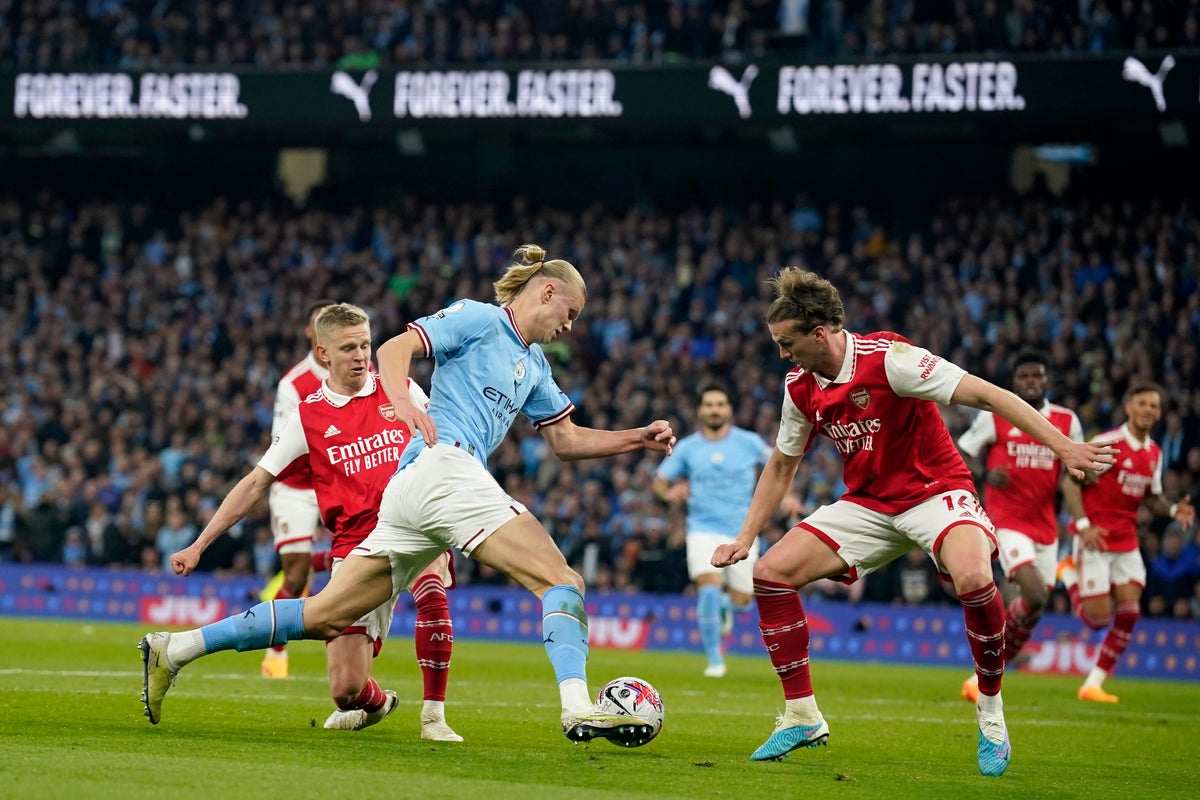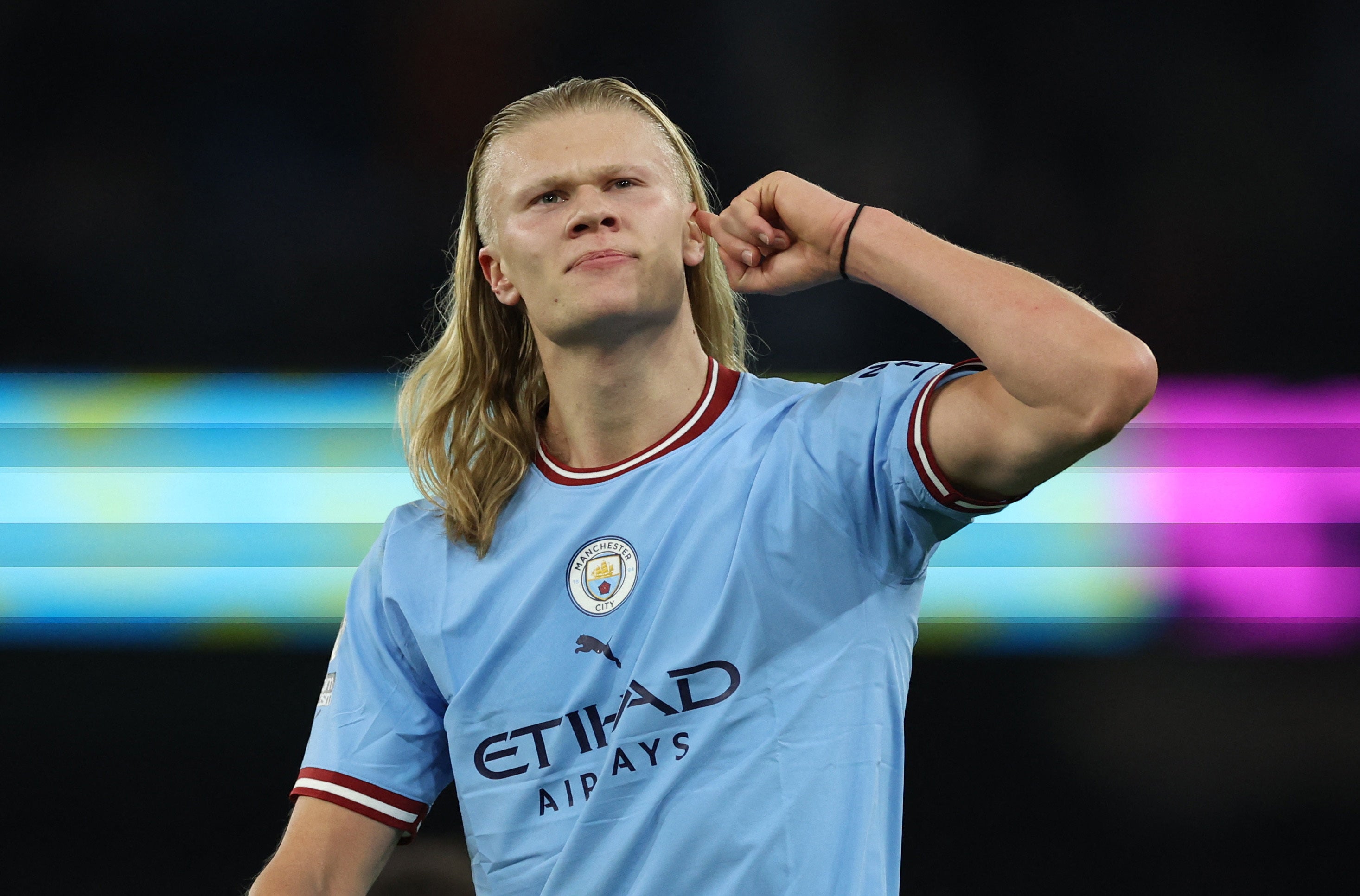
And so it ended all square: Erling Haaland 1-1 Rob Holding. Holding’s was the finer finish, too, curled in from the edge of the box whereas Haaland’s was scuffed. He had the better chance conversion rate: one goal from two shots, compared to the Norwegian’s one from six. Although, of course, the fact a forward with 48 previous goals to his name had six attempts was an indictment of the defender charged with stopping him.
There is a case that Arsenal seasons end when Holding is required to start. A year ago, his sending off in the north London derby shifted the balance in the battle for fourth place to Tottenham. He was unable to deal with Heung-Min Son then, powerless to halt Haaland now. He is not alone in that, obviously: that record-breaking tally of goals cannot come when every centre-back is excelling. But there was something painful, something cruel in Holding’s torment by Haaland. Something predictable, too.
And something decisive. Haaland held off Holding too easily to set up Kevin De Bruyne’s opening goal. The Belgian raced into space. Holding did not get close enough to De Bruyne for his second goal. Perhaps William Saliba would have prevented it, but perhaps Arsenal’s title chances suffered too great a dent when he was injured in March. But it may have been a question of both personnel and policy. Some 34 years earlier, Arsenal had headed north for a title decider, picked five at the back and resolved to keep it tight for the first half. But Arteta is not George Graham and this was not Anfield in 1989.
Holding was hapless, but he was left exposed. Arsenal had a high defensive line, which Haaland and De Bruyne charged behind. “When teams that play so high, they are dangerous,” Pep Guardiola said, though perhaps Arsenal were a danger to themselves. Arsenal committed too many of the midfielders forward with a commitment to man-to-man marking. A side with a sudden frailty from set-pieces conceded from a free kick and after a long throw.
“They were probably at their best, especially in the first half, and we were nowhere near our level,” Arteta said. “When that happens the gap becomes too big and the first 30 minutes all the basic things you have to do against an exceptional team in terms of competing, winning duels, understanding what the game requires, we didn’t do it and we were punished.”
It has been a recurring theme. Over the last three weeks, only Leeds have conceded more goals than Arsenal’s 11, and they have let in five and six in matches. Arsenal have conceded two, two, three and four. They have conceded three in the first 10 minutes, two in injury time. Being breached three times by Southampton was more damning than sieving four to City.
All of which could have offered grounds for change, to alter a formula that had stopped working. Perhaps Arteta could have used three centre-backs or tried a lower block. Their progress may be a product of his micromanagement: he drilled a team in one way, forging an identity with a relentless focus on his way. But Arsenal would not or could not change. The pragmatic shift would be to sit back for the first half-hour. It was not Arteta’s approach. “We have to be loyal to what has brought us this way,” he said. “We have done it in the past.”

Perhaps City would have run riot anyway, but this felt too easy. Arteta’s record has offered a defence but until the last week, Arsenal had only conceded three goals in a league game twice this season. Now they have done twice in a row. It could be called the Holding effect, though a fairer appraisal would incorporate a host of individual errors, the loss of form of players such as Thomas Partey and a patched-up rearguard in which Gabriel Magalhaes had perhaps his worst game of the campaign.
The final verdict may be that the Europa League cost Arsenal the Premier League title: not by progressing in continental competition, with its added workload, but in the collateral damage of their exit. The loss of Takehiro Tomiyasu and William Saliba, the former definitely for the season and the latter potentially, propelled Holding to prominence. It removed the obvious alternative to Ben White at right-back, in turn making it harder to shift him into the middle. It took out perhaps the best centre-back of the first three-quarters of the campaign. Yet Saliba’s excellence only increased the difference between the first-choice and his understudy: the drop-off to Holding is too big; Arteta may envy Guardiola his battalion of five high-class centre-backs.
Whereas Arsenal have felt very reliant on a first 11 who have worked wonders this season. Some back-ups, like Leandro Trossard, have made valuable contributions. Others, like Holding, have been found wanting. He is, in cricketing terminology, a good tourist; a likeable figure, a good man to have in the dressing room. Just not on the pitch. And definitely not on the pitch against Haaland.







